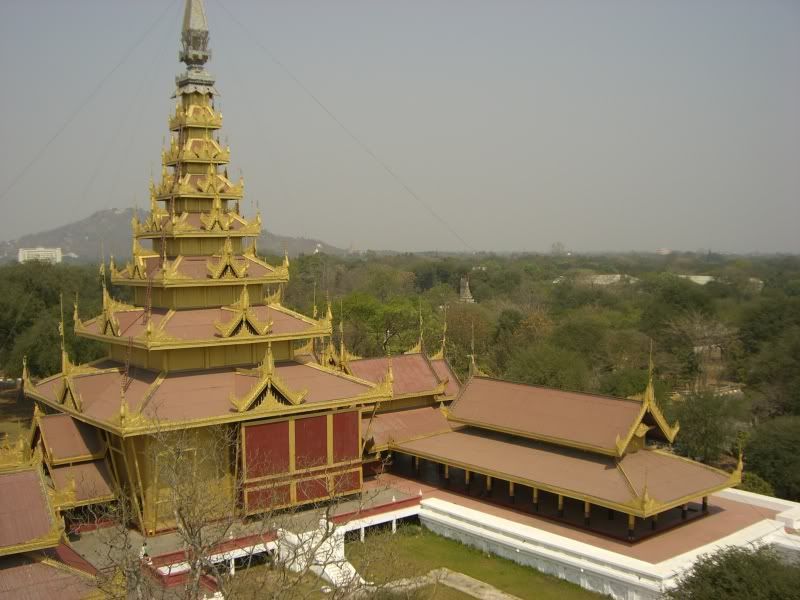
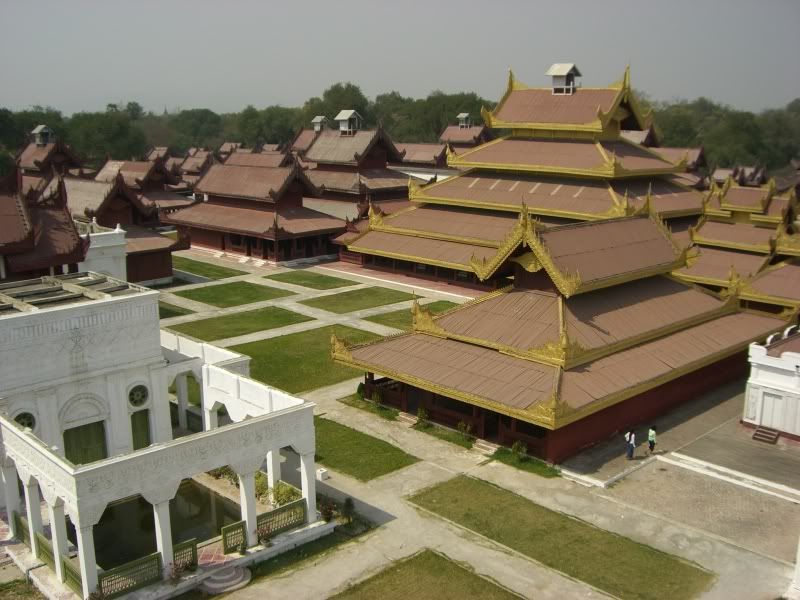
Mandalay Palace complex
(click on photos for full album)
Myanmar consistently defied my expectations. After experiencing the outdated infrastructure and basic facilities in Yangon and Bagan, I expected more of the same in Mandalay.
Instead, I got a booming, modernizing city. Mandalay was close to China, and it was flourishing from trade with the mainland. Myanmar provided raw materials, like gas and jade. In return, China sold manufactured goods (and probably military hardware).
Everywhere I looked, Mandalay seemed like the "new cities" I'd seen sprouting all over China. Giant warehouse stores, shop stalls selling household products, and lots of trade going on. The people even had more fashionable clothes. It was like a mini-Shanghai in Myanmar.
Running into the same travelers over and over in Myanmar is virtually guaranteed. Everyone goes to the Big 4: Yangon, Mandalay, Bagan and Inle Lake. Add to this recipe is that fewer travelers go to the country in the first place and visas are only valid for 28 days. During my trip, I'd constantly encounter familiar faces.
This is welcome, since staying in touch while in Myanmar is impossible. SIM cards are overpriced, and Internet connections are pretty bad. I couldn't work on my blog the whole time I was in the country, because it would have taken ages to upload the photos.
The lack of communications forced me to be really old-school in arranging meet-ups with travelers. While in Yangon, I'd become good friends with Stephan, an expat from Quebec who ran a trading business in Thailand. Later, we met up in Bagan and had dinner. Since we were both going to Mandalay next, it was inevitable that we should try to meet.
"How about we stay at the same hotel?" I suggested.
"Okay. I think Royal City Hotel is good," Stephan said.
"All right, let's both stay there," I said.
"Great."
"Wait!" I said. "What if it's full? We should decide on a backup hotel. If we can't stay at Royal City Hotel, at least we'll both go the same second choice."
"Oh, right!" Stephan looked at the guidebook for a moment. "How about the Silver Swan Hotel?"
"Then it's settled. Royal City first, then Silver Swan," I declared.
Stephan took the Bagan-Mandalay ferry, while I opted to fly with Air Bagan (it has shady connections, but what doesn't in this country?).
Neither of us wanted to take our chances on buses. In Myanmar, the bus trips are long (20+ hours) and over some of the worst roads in Asia. One Canadian girl complained, "The roads here are even worse than Mongolia!"
Upon arriving at the Royal City Hotel, I set about tracking down Stephan.
"Excuse me, did my friend arrive yet?" I asked.
"Where is your friend from?" the Burmese receptionist asked.
"He's from Quebec, Canada," I said.
The receptionist ran her finger down the guestbook. Then she stopped at a name. "Ah! Is your friend a little . . . ?" She gestured with her hands to indicate someone overweight.
"Yeah!" I said excitedly. "That's him!"
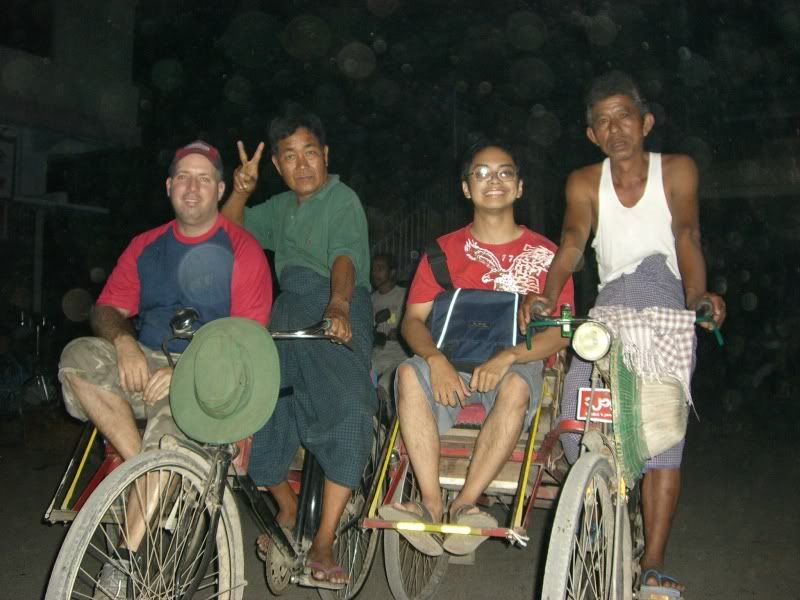
Stephan and I rolling up into the Mandalay Night Market
Since Stephan got to Mandalay a day before me, he had already seen a lot. We talked over dinner at BBB about the sights. He favored seeing Mandalay Palace over the Mandalay Hill.
My first impression was that the palace reminded me of the Forbidden City in Beijing. A massive walled city-within-a-city. The main difference was that the Mandalay Palace felt more overtly militaristic. Lots of soldiers around, because the complex housed an army barracks.
Although Myanmar was ruled by a harsh military regime, it wasn't really evident when I walked around the country. Labor camps and detention centers were hidden from public view. Mandalay was the first place where I felt the government's iron fist.
Just outside the palace on the highway, I saw this propaganda billboard.
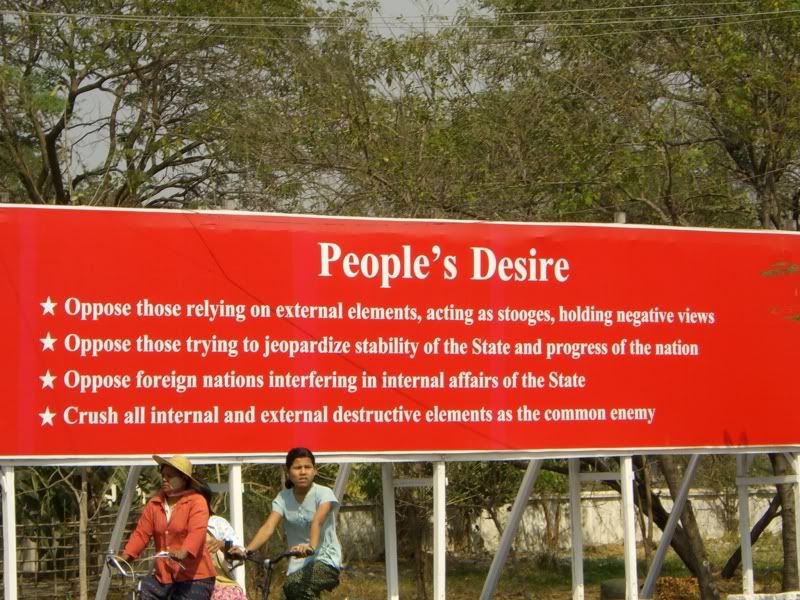
(Click to enlarge)
That was the sort of thing I expected to see if I visited North Korea. Myanmar is a bit freer with tourists, compared to the DPRK. I didn't have to travel on a package tour (shudder) and have a government chaperone accompany me at all times.
Certain areas, like Shan state, are off-limits to tourists because the government is waging a war against ethnic minorities who seek autonomy and even outright independence. The Karens are a prime example.
One of the big differences between Mandalay Palace and the Forbidden City is that there is a thriving town inside it. There's an entire community that lives within the walls of the palace. As I strolled toward the old complex, I passed women washing clothes, cooking food and people pedaling on bicycles. Like other places I visited in Myanmar, there wasn't a strict division between the community and the tourist site.
In the complex itself, the palace buildings were grand, in that uniquely Southeast Asian aesthetic of vivid colors and gold-leaf trim. I'd seen similar architecture in Thailand and Laos.
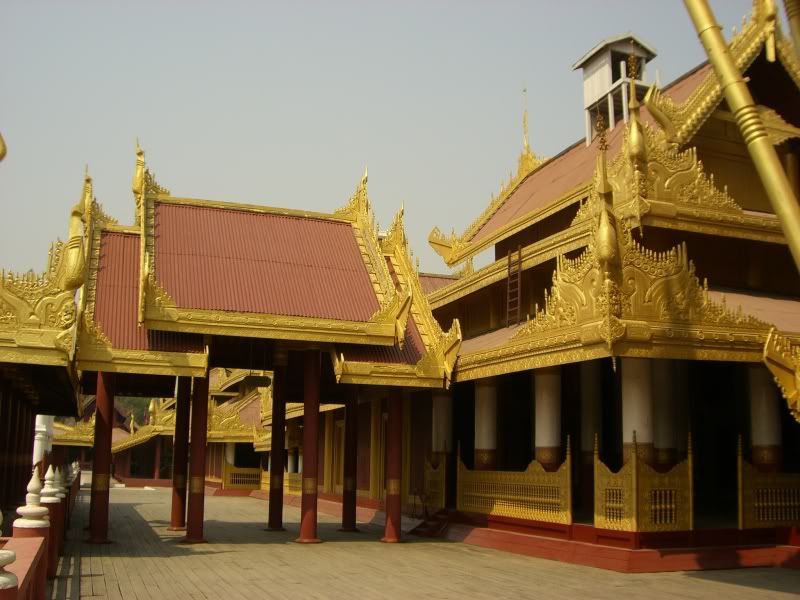
A couple of bright white sugar-cubed buildings stood out. They seemed more like something I'd see in Greece (for example Santorini), not in Southeast Asia.
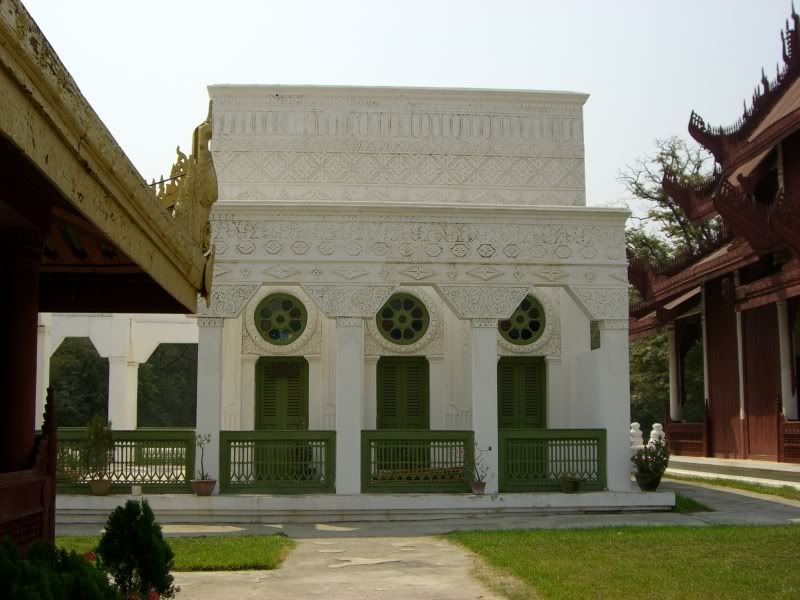
The most interesting thing happened to me as I was walking on the long road to exit the complex. Familiar sounds started wafting to my ears. As I got closer to an intersection, I recognized it: hip-hop music.
But where was it coming from? I turned my head and tried to walk toward the sound. Then my eyes fell on two soldiers sitting down on the sidewalk at the intersection. An old stereo was at their feet. They were listening to the rapper spinning his rhymes, while they smoked and had no expression on their faces. The music was in English! From America!
When one of the soldiers looked at me, I spun away quickly and picked up my pace. Didn't want to get into trouble in a country like this.
Still, I couldn't help but feel a little hopeful. In spite of economic sanctions, international isolation and a xenophobic government that tried to block all foreign influences, something had slipped through. Even a brawling military junta can't keep down the renegade street beats!




3 comments:
Thanks Marcus,for saying that im very muscular :)
eva air vietnam
vé máy bay giá rẻ đi mỹ khuyến mãi
vé máy bay korean airlines
vé máy bay từ tphcm đi mỹ
đặt vé máy bay đi canada
Những Chuyến Đi Cuộc Đời
Du Lich Tu Tuc
Tri Thuc Du Lich
Karayolu yurtdışı kargo
Denizyolu yurtdışı kargo
Havayolu yurtdışı kargo
Demiryolu yurtdışı kargo
Avusturya yurtdışı kargo
WSPRTY
Post a Comment